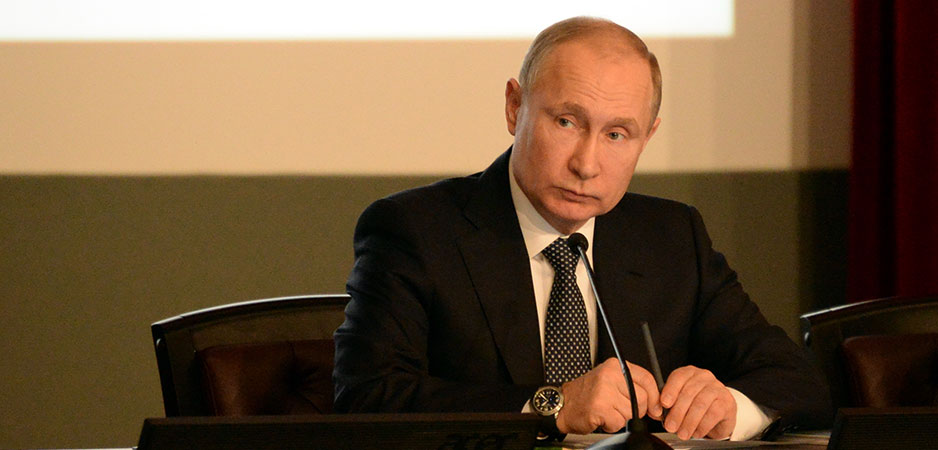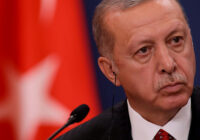Since the beginning of 2020, Russian President Vladimir Putin’s popularity has dropped to its lowest point in 14 years. From February to March, Putin’s favorability dropped from 69% to 63%, and his disapproval ratings rose from 30% to 36%. While the Russian president continues to have a net favorability among his citizens, the declining numbers pose challenges for Putin’s efforts to maintain control over the country’s political system through a constitutional referendum that could extend his grip on power until 2036.
Coupled with substantial economic losses in the first quarter of 2020 and exponentially increasing COVID-19 infections, Putin faces challenges on many fronts. From Moscow to Washington, Kremlin analysts and political pundits could be tempted to forecast the end of the road for the Russian president. However, these unfortunate circumstances are unlikely to bring an end to President Putin’s 20-year tenure in Russian politics.
Economic Downturn
Like many nations around the world, Russia is combating two major threats: the continued spread of COVID-19 and a severe economic downturn — the latter of which is partially attributable to the coronavirus outbreak but exacerbated by a global collapse in oil prices, causing revenue from Russia’s largest export to dwindle, expected to decline by 3 trillion rubles ($39.5 billion) for 2020. The economic situation in Russia is dire. Year to date, the Russian Trading System (RTS) stock index lost 27% of its value, and the Russian Central Bank predicts the country’s GDP will decline 4% to 6% in 2020, primarily due to the decrease in oil exports.
Putin Is Leaving, But Not Saying Goodbye
Prior to 2020, Russia was experiencing historically low levels of unemployment. However, a study by the Higher School of Economics Institute for Social Policy now estimates that unemployment could increase sixfold over the upcoming months, to 5.3 million people. To combat the effects of rising unemployment, the Russian government raised the maximum amount of unemployment benefits to 12,130 rubles ($160), per month, with an additional 3,000 rubles per month for each child, slightly higher than the country’s minimum wage of 10,800 rubles per month.
Putin has previously demonstrated an ability to weather economic downturns, often blaming the US or other foreign actors for the country’s financial troubles. For example, Russia’s economic downturn of 2014-15 corresponded with some of Putin’s highest favorability ratings. His response to the global pandemic could turn out to be a different story.
Insufficient Measures
Russia has implemented extensive measures to prevent the spread of COVID-19, but it remains unclear whether these steps are sufficient to contain the disease. In Moscow, where the outbreak is worse, city employees are setting up 44 temporary hospitals, with the ability to treat over 10,000 patients. On March 30, Putin announced a nationwide stay-at-home order, which according to a recent poll was supported by 61% of the population. The order was lifted on May 12, but quarantines remain in place in cities like Moscow and St. Petersburg. Public gatherings, including religious activities and holiday celebrations, have been either canceled or moved online. Russia’s most important celebration of national pride, the Victory Day Parade in Moscow, which was scheduled for May 9, was postponed for the first time in its 75-year history.
On April 28, Putin announced in a speech that national social distancing measures slowed the spread of the virus and that the situation was under control. But the data show a different story. On the date of his speech, roughly 94,000 Russians were confirmed to have COVID-19. By May 19, nearly 300,000 had contracted the virus. Additionally, the newly appointed prime minister of Russia, Mikhail Mishustin, announced that he had tested positive for the virus, just two days after Putin’s speech; two weeks later, Putin’s close ally and Kremlin spokesperson, Dmitry Peskov, was hospitalized with the virus.
In addition to the rising infection numbers, numerous questions have arisen regarding the effectiveness of the country’s treatment and testing capabilities. In Moscow, 50% of the patients being treated for COVID-19 have tested negative for the virus, according to Mayor Sergei Sobyanin, who has criticized Putin’s response to the outbreak as being insufficient.
A recent survey placed Putin’s response to the pandemic below the actions of local leaders across Russia, a bad signal for a president who embraces a strong centralized leadership style. According to a Levada Center poll, 46% of respondents said that Putin was doing everything he could do to fight the pandemic, while 18% claimed the measures were excessive, and 30% said they were inadequate. In contrast, when asked about their local leadership, 50% said the governors were doing everything that they could, 15% perceived the measures as excessive, and 30% considered the response inadequate.
Too Soon to Tell
It is still too soon to tell whether Putin’s handling of the pandemic will ultimately boost his popularity or cause his base of support to deteriorate. While extreme measures have been taken to combat the outbreak, the measures are yet to show signs of success.
On April 22, Russia was due to hold a constitutional referendum that would reset the country’s presidential term limits, allowing Putin to run for two additional 6-year terms and remain in power until 2036. Under the current constitution, the president cannot serve more than two consecutive terms. Nevertheless, the COVID-19 crisis forced the government to delay the referendum to an unspecified future date, throwing a wrench in Putin’s plans to consolidate power.
Public opinion about the referendum is neck and neck. In a March 20 poll, 48% of Russians supported the proposed constitutional changes, while 47% opposed them. In the same poll, 46% of respondents would like Putin to remain in power after his current term ends in 2024, while 40% do not want this.
If a majority of Russians vote against the proposed constitutional changes, the setback will pose a major blow for President Putin’s image and political future. Without being able to serve a third consecutive term, his tenure would end on May 7, 2024. Before then, he could set up a puppet government and designate a political ally to take over the presidency while maintaining control of the country in the background as he did in “tandem” with Dmitriy Medvedev in 2008. He could also continue to serve in violation of the constitution or step aside from Russian politics altogether, two much less likely options that could face major backlash from Russian citizens.
While the current polls show Putin’s popularity at a low point, he maintains a political advantage. A majority of Russians continue to support him, and his proposed constitutional changes retain a narrow margin over the opposition. Putin’s handling of the current COVID-19 outbreak could greatly impact his popularity among Russians, either to his benefit or, more likely, his detriment. But despite the sudden economic downturn and a global health crisis, Putin is likely to remain in power and secure his position in Russian politics until 2036.
The views expressed in this article are the author’s own and do not necessarily reflect Fair Observer’s editorial policy.
Support Fair Observer
We rely on your support for our independence, diversity and quality.
For more than 10 years, Fair Observer has been free, fair and independent. No billionaire owns us, no advertisers control us. We are a reader-supported nonprofit. Unlike many other publications, we keep our content free for readers regardless of where they live or whether they can afford to pay. We have no paywalls and no ads.
In the post-truth era of fake news, echo chambers and filter bubbles, we publish a plurality of perspectives from around the world. Anyone can publish with us, but everyone goes through a rigorous editorial process. So, you get fact-checked, well-reasoned content instead of noise.
We publish 2,500+ voices from 90+ countries. We also conduct education and training programs
on subjects ranging from digital media and journalism to writing and critical thinking. This
doesn’t come cheap. Servers, editors, trainers and web developers cost
money.
Please consider supporting us on a regular basis as a recurring donor or a
sustaining member.
Will you support FO’s journalism?
We rely on your support for our independence, diversity and quality.






